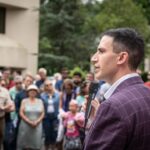The Divine Inquiry: On Jesus Christ
The novelist Louis de Wohl wrote in the Restless Flame, his novel about Saint Augustine that you cannot bypass Christ. For his part, Ven. Fulton Sheen, the famous archbishop and theologian, wrote in his Life of Christ that no one who encounters Christ stays the same. Bishop Sheen also noted that whatever one may think of Jesus of Nazareth, it is undoubtedly clear that He, quite literally, broke history in two, before and after His birth.
The claim made by Jesus is extraordinary. Christ and His Church claimed and continue to claim that He was God in the flesh. It begs the question, famously articulated by C.S. Lewis, what are we to make of Jesus Christ? The disciples themselves struggled with this question. When they were terrified in the middle of a storm and saw Christ calm the winds and the seas, they asked themselves, “What sort of man is this, whom even the winds and the sea obey?” (Matthew 8:27).
In my experience, the claim of divinity by Our Lord can be avoided, a bit. Modern man is not comfortable with religious things, and Christ’s claim boggles the minds of both Ancient and Modern peoples. The philosopher Peter Kreeft, for example, explained that in Antiquity, many people argued against Jesus by claiming that it was inconceivable that the Divine would lower itself to the rank of mortal man. For modern man, it is unthinkable that there is anything like God. Many people, myself at one time, when they encounter Christ, prefer not to look seriously at Him. We are inclined to view Him as a nice man, a mystic, and to find “rationalizations” for His miracles and His claims.
In other words, it is easier and more comfortable not to look at Him because when one encounters Christ personally, when one does examine Him, one can never really be quite the same. As Lewis explained in his essay, throughout the Gospels, Jesus behaves in a manner unique in human history. For instance, Christ went around telling people, “I forgive your sins,” by which one can ask then and now, with what authority? Who does this Man think He is to go around forgiving other’s sins? But that is not all. As Lewis writes,
Then there is a curious thing, which seems to slip out almost by accident. On one occasion, this Man is sitting looking down on Jerusalem from the hill about it and suddenly in comes an extraordinary remark — ‘I keep on sending you prophets and wise men.’ Nobody comments on it. And yet, quite suddenly, almost incidentally, He is claiming to be the power that all through the centuries is sending wise men and leaders into the world. Here is another curious remark: in almost every religion there are unpleasant observances like fasting. This Man suddenly remarks one day, ‘No one need fast while I am here.’ Who is this man who remarks one day, ‘No one need fast while I am here.’ Who is this Man who remarks that His mere presence suspends all normal rules?
All actions and claims of Divinity, of a behavior that He is entirely without Sin or fault. However, one of the most important moments of His claim to Divinity was that which sealed His fate when He claimed, ‘before Abraham was, I am.” Jehovah, He claimed to be Jehovah—the name which for the Jews was death to utter.
And so, one is left with the famous trilemma. Either this Man was lying, He was insane, or, most frightening of all, He was telling the truth. For that reason, when one examines the claim, one must, in the end, either accept or reject the story. There is, fortunately, no middle ground. Either Jesus of Nazareth was and is the Son of the living God, or He wasn’t. That is why all attempts to “critically examine” the life of Christ, to strip away the Divinity, in the end, are just rejections of the story.
One time, I was told the theory that Christ, after being crucified, was sealed off in a cave, which prevented infections from setting in and killing Him. After that, He healed naturally and walked away. This is, of course, a sort of miracle view, but it rejects all the evidence. For one, the Romans were efficient at ensuring their enemies were dead. It would be extraordinary to assume they failed in killing Someone who, for them, was just a common criminal.
Additionally, it ignores the scourging, pain, and mortality of crucifixion and, very importantly, the fact that He was stabbed in His side by a spear that pierced all the way to His heart. No one could have survived that. Not only that, but one is tempted to ask if He survived in a purely natural way… Where was He? Why did Roman or Temple authorities not find Him? Where did He vanish?
Not only that, but it is a sort of ignorant pride to assume that our ancestors were so idiotic that they could not understand death. With the Gospels, we know that St. Thomas doubted the Resurrection until he saw Our Lord with his own eyes and touched Him. Not only that, but the Apostles also all died believing the same thing. Why would they have been killed for a lie, for a fiction? What benefit would it have given them?
That is why all the attempts to explain the life of Christ skeptically are, in the end, just a rejection of the story. It amounts to denying Him, no matter how people might try to rationalize it. It is natural, of course. The claim of Divinity is a challenging one to accept. As the French philosopher Blaise Pascal explained, if heaven exists, you win big; if it doesn’t, you lose little, but if you bet against it, you risk losing everything. There is then an anxiety of doubt when denying Christ.
Lastly, there is the matter of the Church. If Christ is God, and God is Truth and Goodness, then truth cannot contradict truth. In other words, if Christ is who He said He was, then it is impossible that the many Christian denominations, all contradicting themselves in various points, are correct. How can truth contradict truth? It is for that reason that Christ founded a single Church. Some organism had to preserve Christian Truth for the ages until His return, which is why God likes organized religion. Furthermore, that is why early Christians developed the marks of the Church: One, Holy, Catholic/Universal, and Apostolic. God would not leave His people without knowing the truth, and Christ, in fact, promised that the gates of Hell would not prevail against His Church. This is why the idea of a “great apostasy” is an error. In summary, Christ founded One Church with all the marks described above.
Then it becomes a matter of asking, which Church claims to have those marks? Which Church fulfills those marks? There is only one, the Roman Catholic Church. And so, from encountering and seriously examining the claims of Christ, one naturally faces the claims of the Catholic Church to be a divine organism, custodian of moral and religious truth till the end of time.
With the Catholic Church, one also encounters the same trilemma of her Founder. It is either a lie, a fairy tale insanity, or true. There is no middle ground. Either you accept or reject the story. But notice how intertwined they are, the claims of Christ and the Church. It is no surprise. The Catholic Church is, after all, the Mystical Body of Christ. Christ and His Church are one. That is what Saint John Henry Newman meant when he wrote that “to be deep in history is to cease to be a Protestant.”
In short, as Fulton Sheen wrote, “Christ, therefore, still walks the earth, now in His Mystical Body, whereas then in His physical Body. The Gospel was the prehistory of the Church, as the Church is the post-history of the Gospel.” CHRISTO VERO REGI.




